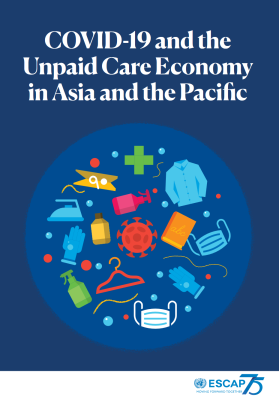COVID-19 and the unpaid care economy in Asia and the Pacific
To leave no one behind and to reach those furthest behind first are the essential ambitions of the 2030 Agenda for Sustainable Development. Within that mandate, Sustainable Development Goal 5 (achieving gender equality and the empowerment of all women and girls) must be a cornerstone of actions taken to achieve a prosperous, inclusive and sustainable future for the Asia-Pacific region.The COVID-19 pandemic has exacerbated the risks and vulnerabilities for women and girls across the region. Yet, all the while, women have taken up essential roles in the pandemic response as front-line health care workers as well as in their homes. The introduction of lockdowns, mobility restrictions and school closures have greatly increased the time spent on household chores. Women have had to clean, wash, cook, and care for home-schooling children and household members who are sick or elderly. Many of the hard-fought gains over the past decades have been reversed, and existing inequalities have further deepened. Even before the pandemic, women and girls in Asia and the Pacific spent on average up to 11 hours a day on unpaid care and domestic work — four times more than men.This report argues that a unique opportunity is upon us to better address the risks and vulnerabilities of women and girls and help them out of poverty, exclusion and marginalization. Governments must seize this opportunity to invest in the care economy by recognizing, redistributing and reducing unpaid care and domestic work. Such investments will help relieve the care burden and generate decent employment, which in turn will increase the resilience and long-term growth of economies.



